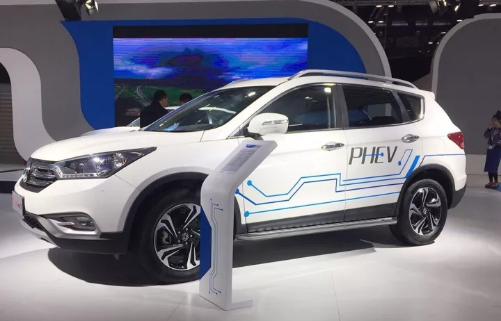Full coverage: China Breakthroughs
By Tom McGregor, CCTV.com Panview commentator and editor
New energy vehicles, particularly electric vehicles (EVs), are expected to become very popular in the decades to come, since people have gotten more eco-friendly conscious. EVs run on batteries that require recharging and do not contribute to carbon emissions.
In the initial phase of the emerging EV battery market, Japan-based Panasonic was considered the leading manufacturer in the field. Then South Korean conglomerates Samsung and LG Chem had developed them further, but still there was much room for improvement.
Chinese battery firms, including the country’s leading player - CATL (Contemporary Amperex Technologies Ltd.) based in Ningde, Fujian Province, as well as Tianjin-based Lishen Battery and Hangzhou’s Wanxiang Group, have garnered greater recognition as the top innovators in the EV battery market.
Chinese scientists and green technology developers have made some amazing headway.
CATL taking charge
China is attracting many international automakers to shift operations into the country, since a larger number of customers come from the country. The world’s big automakers, such as GM, Ford, BMW and Daimler AG (Mercedes Benz) have stepped up efforts to introduce new EV models in the global market.
But EV assembly plants must boost battery production to meet soaring demand. Germany-based BMW announced CATL will supply batteries for their EV models with its plant in China that will produce 33,000 high-voltage battery packs annually.
CATL has also forged partnerships with Chinese automakers - Dongfeng Motor Corp. and SAIC Motor.

(New models of new energy vehicles manufactured by Dongfeng Motor Corp. showcased at the 5th China International Energy-saving and New Energy Vehicle Exhibition on Oct. 18-21,2017. Photo from Xinhua)
"We continue to walk where the country guides us," CATL CEO Huang Shilin told AutoBlog. "We hope by 2020 we can achieve performance and pricing that lead the world."
Beijing has set ambitious targets to support the EV industry.
Beijing's bold plans
In Sept. 2017, the Central Government introduced a measure that would forbid the purchase of gas-filled vehicles in China by 2040. Some experts expressed doubts whether the new law will be enforced, but when taking a closer look at China's EV market you see that plans had already been laid well in advance.
"All carmakers are under great pressure in terms of energy cars," Liu Weidong, deputy general manager of Dongfeng Motor Corp. told China Daily. "We at Dongfeng are tech-oriented and place great emphasis on core technologies and resources."
Dongfeng would invest RMB10 billion (US$1.54b.) by the end of 2017 into supplying and upgrading EV batteries, motors and electric control systems.
Starting from 2019, Beijing requires all automakers selling vehicles in China to produce a set numbers of new energy cars, targeting five million EVs to hit the road by 2020.
Huge surge for batteries
"As the policy is promulgated, sales of electric cars will surge in the coming years and so will demand for batteries," Wang Chuanfu, chairman of Shenzhen-based BYD, an electric car and bus manufacturing giant, told National Business Daily.
The China Association of Automobile Manufacturers forecast EV sales to reach 700,000 in the country by the end of the year, a 40 percent rise, year-on-year. BYD is poised to see soaring revenues growth.
BYD has signed a joint venture agreement with Guoxuan High-Tech Power Energy Co., an EV battery maker in Anhui Province.
For Chinese battery makers, the focus is on producing lithium-ion cells that account for 90 percent of EVs produced in the nation and 70 percent share of the global market, according to Forbes Magazine.
Additionally, Daimler AG will invest 300 million euros to secure contracts from Chinese suppliers of lithium-ion batteries for its EVs.
Expect stiffer competition
Despite an upsurge of revenues, experts anticipate many companies may not survive in the upcoming years.
"China now has some 200 battery-makers, but only 40 or 50 will survive three or five years later," Fang Jianhua, former head of Guoxuan High-Tech Power Energy, told Securities Daily. "The top five will hold at least 70 percent of the market."
In order to adapt to fast-changing market conditions, battery makers are going straight to the source, buying stakes in natural resources firms. In Sept. 2017, Great Wall Motor, China's largest SUV-maker, invested RMB146 million for a 3.5 percent share of Pilbara Minerals, which owns the Pilgangoora lithium-tantalum project in Western Australia.
Chinese battery companies need to expand up and down the supply chain to capture stronger positioning in the market.
Marching on with new advances
When it comes to the latest developments of EV batteries, the world's eyes are set on China. The Japanese introduced the new technology, the Koreans added some upgrades and the Chinese are taking it to a whole new level with groundbreaking innovations and blazing new trails on mass production.
The future of EVs will be here in China, since Beijing has taken steps to reduce pollution and as the Chinese grow richer and more supportive of eco-lifestyles, they will likely see EVs as a positive force for good.
But EVs still have some drawbacks and Chinese companies should conduct further R&D (research and development) in the areas of boosting their reliability, lengthening running times and ensuring greater access to recharging stations nationwide.
And with certainty, we can expect more advances to come soon.
(The opinions expressed here do not necessarily reflect the opinions of Panview or CCTV.com. )

Panview offers a new window of understanding the world as well as China through the views, opinions, and analysis of experts. We also welcome outside submissions, so feel free to send in your own editorials to "globalopinion@vip.cntv.cn" for consideration.
















